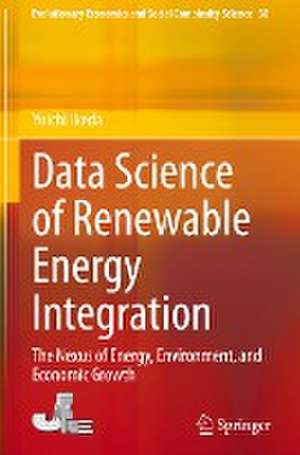Data Science of Renewable Energy Integration: The Nexus of Energy, Environment, and Economic Growth: Evolutionary Economics and Social Complexity Science, cartea 30
Autor Yuichi Ikedaen Limba Engleză Hardback – 21 feb 2024
Din seria Evolutionary Economics and Social Complexity Science
- 18%
 Preț: 792.34 lei
Preț: 792.34 lei - 15%
 Preț: 643.84 lei
Preț: 643.84 lei - 18%
 Preț: 723.21 lei
Preț: 723.21 lei - 18%
 Preț: 742.61 lei
Preț: 742.61 lei - 24%
 Preț: 634.35 lei
Preț: 634.35 lei - 15%
 Preț: 639.08 lei
Preț: 639.08 lei - 18%
 Preț: 730.16 lei
Preț: 730.16 lei - 15%
 Preț: 706.48 lei
Preț: 706.48 lei - 15%
 Preț: 583.61 lei
Preț: 583.61 lei - 18%
 Preț: 784.30 lei
Preț: 784.30 lei - 18%
 Preț: 721.01 lei
Preț: 721.01 lei - 15%
 Preț: 527.15 lei
Preț: 527.15 lei - 15%
 Preț: 644.63 lei
Preț: 644.63 lei - 15%
 Preț: 523.22 lei
Preț: 523.22 lei - 15%
 Preț: 638.24 lei
Preț: 638.24 lei - 18%
 Preț: 728.60 lei
Preț: 728.60 lei -
 Preț: 388.90 lei
Preț: 388.90 lei - 18%
 Preț: 737.26 lei
Preț: 737.26 lei - 15%
 Preț: 696.35 lei
Preț: 696.35 lei - 15%
 Preț: 690.11 lei
Preț: 690.11 lei - 15%
 Preț: 692.24 lei
Preț: 692.24 lei - 18%
 Preț: 1006.24 lei
Preț: 1006.24 lei - 24%
 Preț: 570.15 lei
Preț: 570.15 lei -
 Preț: 388.72 lei
Preț: 388.72 lei - 18%
 Preț: 1004.81 lei
Preț: 1004.81 lei - 15%
 Preț: 642.68 lei
Preț: 642.68 lei - 18%
 Preț: 730.65 lei
Preț: 730.65 lei - 18%
 Preț: 729.53 lei
Preț: 729.53 lei - 15%
 Preț: 695.85 lei
Preț: 695.85 lei - 18%
 Preț: 732.52 lei
Preț: 732.52 lei
Preț: 789.52 lei
Preț vechi: 962.83 lei
-18% Nou
Puncte Express: 1184
Preț estimativ în valută:
151.08€ • 161.55$ • 125.96£
151.08€ • 161.55$ • 125.96£
Carte tipărită la comandă
Livrare economică 18 aprilie-02 mai
Preluare comenzi: 021 569.72.76
Specificații
ISBN-13: 9789819987788
ISBN-10: 9819987784
Pagini: 324
Ilustrații: XVIII, 324 p. 1 illus.
Dimensiuni: 155 x 235 mm
Greutate: 0.66 kg
Ediția:2024
Editura: Springer Nature Singapore
Colecția Springer
Seria Evolutionary Economics and Social Complexity Science
Locul publicării:Singapore, Singapore
ISBN-10: 9819987784
Pagini: 324
Ilustrații: XVIII, 324 p. 1 illus.
Dimensiuni: 155 x 235 mm
Greutate: 0.66 kg
Ediția:2024
Editura: Springer Nature Singapore
Colecția Springer
Seria Evolutionary Economics and Social Complexity Science
Locul publicării:Singapore, Singapore
Cuprins
Chapter 1. Today’s Our System.- Chapter 2. Statistical Analysis.- Chapter 3. Fluctuation and Correlation of Renewable Energy.- Chapter 4. Optimization and Dynamical System.- Chapter 5. Grid flexibility.- Chapter 6. Grid Integration of Renewable Energy.- Chapter 7. Evolving Microgrid Network and Power Market.- Chapter 8. Foreign Direct Investment in Renewable Energy.- Chapter 9. Hydrogen Energy Storage and Nuclear Energy.- Chapter 10. Blockchain Energy Trade System.- Chapter 11. V2G: Vehicle to Grid.- Chapter 12. Conclusion: Prospects for the Future.
Notă biografică
Yuichi Ikeda, Graduate School of Advanced Integrated Studies in Human Survivability, Kyoto University
Textul de pe ultima copertă
This book covers various data scientific approaches to analyze the issue of grid integration of renewable energy for which the grid flexibility is the key to cope with its intermittency. It provides readers with the scope to view renewable energy integration as establishing a distributed energy network instead of the traditional centralized energy system. Specifically, quantitative valuation system-wise of the levelized cost of energy, which includes both initial cost and various operational costs, enables readers to optimize energy systems in order to minimize economic cost and environmental impact. It is noted, however, that the high cost of integrating renewable energy on a large scale might slow economic growth considerably. Topics addressed in the book also include statistical comparative study of the relationship between energy and economic growth, a graphical model of determinant factors for foreign direct investment in renewable energy, the coupled oscillator model and unit commitment model to capture intermittency of renewable energy, and the network model of evolving micro-grids. The book explains desired innovation to reduce the integration cost significantly using innovative technologies such as energy storage with hydrogen production and vehicle-to-grid technology. Illustrated by careful analysis of selected examples of renewable integration using different types of grid flexibility, this volume is indispensable to readers who make policy recommendations to establish the distributed energy network integrated with large-scale renewable energy by disentangling the nexus of energy, environment, and economic growth.
Caracteristici
Provides readers with the scope to view renewable energy integration as establishing a distributed energy network Analyzes carefully selected examples of renewable integration using different types of grid flexibility Helps policymakers disentangle the nexus of energy, environment, and economic growth
